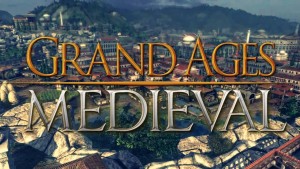


Many players have problems with the economic part of the Grand Ages Medieval. Once the player has more than two cities, the budget goes to the less confident. While training is about traders and shows how to interact with them, but on the proper construction of the path is silent. Now we will understand all this.
Let’s start with the basic. The amount of any commodity is measured by barrels. In the tab “Production” each city has information on all businesses built: the power of the enterprise, number of employees, the cost of maintenance and wages for the week, the number of barrels of production per week and the price of each barrel of production.
Creating a new enterprise, you create new jobs and attract people to your city from the surrounding countryside. Each enterprise can employ up to 25 workers, but because they also take with them their families, along with everyone working in the city arrive 3 additional resident, as a result, each company will increase the number of inhabitants in a total of 100 people.
The economic system is based on the simulation of production, transport and consumption of 20 items:
For the manufacture of certain types of raw materials, it requires major products. For the production of finished goods and luxury items require original products.
As each city can only produce 5 different types of goods without the active trade between the cities can not do. In the course of your trade enterprises and traders operate on the following logic:
Companies produce goods and sell them at the current price in the city market. You receive income from the sale.
Part of the goods consumed in the city itself. The rest can purchase one of your trader. Charges deducted from your money.
The trader sells goods in another city for a higher price.
The level of stocks of goods shown in the trade. Displays in the form of the number of barrels: 0-1 – a shortage of goods, the high price; 2 – more goods than needed, the price falls to an acceptable level, but remains higher than the price of production; 3-4 – available surplus goods, the price in the city market below the cost of production, you are losses.
You can hire a trader at the inn, there, in the next tab, you can order the construction of wagons for the formation of trade caravans. When a trader is right in the city, select it and click the icon carts, wagons give him as many as you see fit.
The trade route – a sequence of cities. To put it, select the merchant and use the “Plan Route”. The maximum length of the trader’s path – 14 towns, he will try to maintain a balance in the number of products between the cities: to buy goods, which the city surplus and sell where they are needed.
After each circle information about merchant upgraded (item Profit from trade). It is the amount of money that he has earned by buying and selling goods on the circle. Once the trader will make two laps, activated button function “Analysis of the change of the route,” in this window you can see what goods between cities on the trade route excess, and any shortcoming.
Important! The trader buys only those goods which are in the city more than is required, nor does it take into account the need for other cities. So often there are situations when the cart with “superfluous” goods do not buy anywhere else. In such cases it is necessary to change the path, add the city to the lack of this product.
These 26 “barrels” brick is not the first round ride in the caravan
Naturally, the ideal solution would be to organize the production chain. The founding of the city in place with all the necessary resources and choose the company so that the finished products and luxury goods produced in the same city, which produced basic commodities and raw materials for them.
Beer is made from grown up in the same city of wheat and metal products – from mined in the same city of metal and coal
Thus industrial city you need allocate their own trader and assign him the way not as a tour of the city, as well as visits to one or two cities and back again to stock up and go to other cities.
Economy in Grand Ages: Medieval
This scheme of the route is good because manufactured goods are sold very quickly, it is not necessary to wait until the trader will do a full circle to once again take the goods. With this route trader mainly engaged in the sales of our products, not trade between other cities.
The results:
Run several traders of the same city, but with a different order of their visit. This will reduce the time of receipt of each city required goods.
Cities with strong production assigned to individual traders. Trading route which every one or two of the city goes back to the main city. These merchants will bring a lot of money by selling goods, not engaged in trade between the other cities.
Do not forget to look into the information on traders and route analysis, adjust the way, if its income lower than others, or there is an excess of goods.
When the cities in your submission is too much important to make sure that each city supplied with the proper goods, and money, and so will be more than enough.



